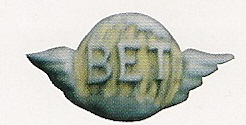
Biotechnia Ellinikon Trikyklon, or BET, was a small vehicle manufacturer founded in Athens by Petros Konstantinou. It was one of several manufacturers - the first appearing in the early 1940s - that converted BMW or other motorcycles into light utility three-wheelers. In 1965 it entirely designed and built a small five-seat passenger car with a BMW 125cc motorcycle engine. Although the type was certified, only one was built due to problems in availability of parts for further production. Following this design, three-wheeled truck models were developed and produced. A second passenger car model was designed and introduced in 1973, known as model 500, with a Fiat 500cc engine. With metal body, seating up to five passengers and featuring very good road handling, it was a rather advanced three-wheeler for its time. It was certified for production and 15 were built, of which one survives to this date in excellent condition. There were even talks with a South African company involving plans for exports or even transfer of production to that country, but they were never realized. The company ceased production in 1975.

MEBEA was an important Greek vehicle manufacturer, producer of light trucks, passenger automobiles, motorcycles, motorbike engines, agricultural machinery and bicycles.
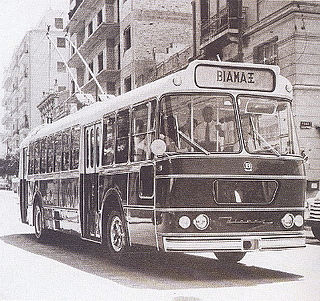
BIAMAX(Proper Greek pronunciation Viamax) was a Greek vehicle manufacturer. In the late 70's it was one of the biggest Greek companies, operating three factories and several other auxiliary facilities throughout the country. In addition, BIAMAX became a leading industry in Greece, in areas including Quality Assurance, technical training, process documentation and Research & Development. Although its main activity was vehicle manufacture, some of its subsidiaries were also involved in areas like tourist services, exports of farm products and shipping.

Petropoulos is today a major importer and distributor of vehicles and heavy machinery, having been, at the same time, one of the "historic" Greek engine and vehicle manufacturers.

STYL KAR was named after its founder, the engineer Stylianos Karakatsanis. Its entire history is representative of many Greek companies who were engaged in the construction of simple utility vehicles.

Alta was a Greek manufacturer of light and heavier three-wheeler trucks, motorcycles and passenger cars. Production of motorcycles and three-wheeler trucks with Sachs 50cc engines started in its first factory in Athens in 1962. The 50S motorcycle model was known for its reliability. In 1967 it designed and developed model A700, a heavier three-wheel truck with 2-cylinder BMW 35 hp engine and a payload of 800 kg. The truck, featuring a pleasant design and high reliability became one of the most successful vehicles of its kind in Greece. In 1968 Alta introduced a three-wheel passenger car, model A200. Powered by a Heinkel 200cc engine, the car was based on the German Fuldamobil, but with Alta's own body design. The company moved production to a new, larger factory in Elefsis where it operated until 1978.

Attica was a brand name of vehicles produced by Bioplastic S.A., a company created in Moschato, Athens by Georgios Dimitriadis, a figure in Greek automotive history.
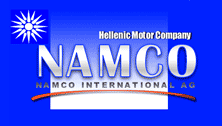
NAMCO is a Greek vehicle manufacturer. It was founded in 1972 by Kontogouris brothers.
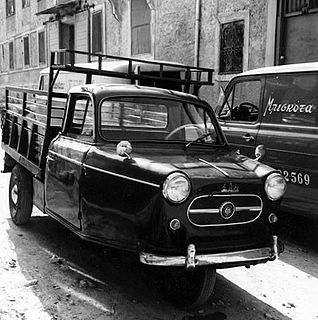
The name SAM stands for Stephanos A. Mbaltas, the founder of this Greek company, one of several that produced three-wheeler trucks in that country, in business between 1966 and 1974. Its first models used 1200cc Volkswagen air-cooled engines, while Ford 1300cc engines powered later models. The chassis developed by SAM was very robust and some of its trucks were surviving 30 years after the company went out of business.
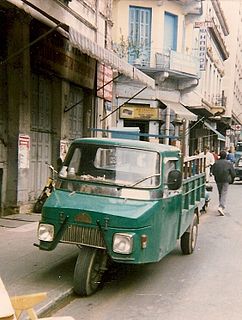
Ros was the trade name of vehicles produced by the Greek company 'Stavros Konstantinides O.E.', based in Athens. The Ros three-wheeler trucks were the most successful of its kind in Greece, having been produced by the thousands. Ros surpassed in sales even "Greek classics" like Alta and Styl Kar, and the characteristic shape of its trucks could be seen for several years in every corner of the country. And for good reason: The 'Rosaki' was one of the most robust and reliable vehicles ever used in Greece. In 2006, 30 years after the end of three-wheeler production, several Ros were still in use in excellent condition, more than any other three-wheeler type.
Agricola was a Greek maker of 4x4 multi-purpose trucks and other farm machinery based in Thessaloniki. The Agricola 25 GT 4x4 truck was a fairly advanced design introduced in 1975, with enhanced all-terrain capabilities, a metal cab and Mercedes-Benz 180D Diesel engine. It was a typical Greek multi-purpose truck with a payload of 1,650 kg (3,638 lb) and a maximum speed 80 km/h (50 mph). The cab was designed by Georgios Michael, designer of other Greek vehicles including the Neorion Chicago and the MAVA-Renault Farma. The vehicle was produced until 1984.

AutoDiana was a Greek truck manufacturer based in Thessaloniki, in operation between 1975 and 1984. Its main product was the 'Unicar' model, a rather heavy-looking 4x4 multi-purpose truck. This robust vehicle had a payload of 1500 kg and used Mercedes-Benz Diesel engine and Dodge axles. Its fate, along with similar Greek multi-purpose trucks like the Petropoulos Unitrak, the Agricola, the Motoemil Autofarma, the Balkania Autotractor, the Namco Agricar and others, was sealed when a change of Greek law in 1984 modified taxes and duties for such 'farm' vehicles. Production was terminated the same year ending a "career" of decent sales among customers in the Greek countryside.
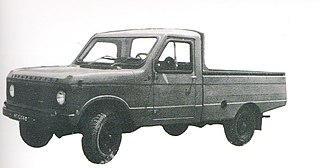
Balkania was the trade name of 'K. Zacharopoulos A.B.E.E.' a Greek industrial and trading company based in Athens that produced 4x4 jeep-type vehicles and 4x4 trucks. Since 1945, K. Zacharopoulos had been involved in vehicle repair and rebuilding. The Balkania company was founded in 1954 and since 1972 it imported Romanian and Indian vehicles. In 1975 it designed and introduced its own Autotractor model, a 4x4 multi-purpose truck with a Mercedes-Benz 3200 cc Diesel engine, metal cabin and a payload of 1,500 kg (3,307 lb). In 1979 the model was redesigned, with a modern synthetic cabin. It was produced, as some similar Greek vehicles, until a change of a favorable categorization for agricultural vehicles in 1984 limited its prospects. The vehicle was modestly successful, as it exhibited certain quality problems.
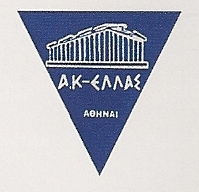
AK Hellas was a Greek manufacturer of light trucks and other metal products. It designed and produced two basic types of vehicles - all three-wheelers with 50cc engines, taking advantage of a favorable classification as "motorbikes" according to Greek law. One group of models it produced since 1965 were light trucks with "motorcycle" structure, a type of vehicle also produced in Greece by MEBEA, Mego, Alta, Saracakis, Pitsos, Markal, Naxos and others. The other group of models were "proper" micro-trucks, with "automobile" structure of steering, controls etc. It was in this category that AK Hellas became the biggest truck manufacturer in Greece, leaving behind MEBEA, Delta, Minicar, Zamba and other smaller Greek manufacturers. The company's T200 model, using a Sachs 50cc 4.8 hp engine and with a payload of 150 kg was produced between 1968 and 1975 with three different cab designs and in several versions. According to Dimitrios N. Aggelopoulos, several thousand units were produced, while other branches created by the same entrepreneur, were involved in production of pleasure boats, biological cleaning units, telephone booths, phone switchboards, generating sets, helmets, storage tanks, prefab container houses, wind turbine blades, irrigation systems, etc.
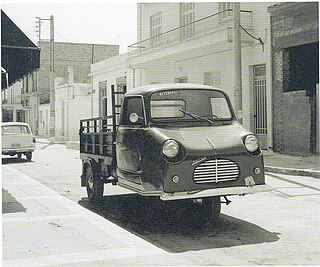
MotorCar was a Greek three-wheeler truck manufacturer, in business between 1967 and 1971. It was one of the smaller in its category, although rather "professional" in its quality of design and construction. Its models used a chassis developed by MotorCar, in two versions using Volkswagen and German Ford engines, respectively. According to their classification, both models could legally carry only 350 kg, although in practice they were loaded with up to 2 tonnes by their users.

EBIAM was a Greek company based in Thessaloniki that, among others, produced 4x4 trucks. It belonged to a generation that benefited from a Greek law classifying any vehicle that could be used for agricultural purposes as "agricultural machinery".

Candia is a Greek company producing Agricultural machinery and equipment, based in Herakleion, Crete. It is representative of many companies in this country, that produced multi-purpose light farm vehicles.
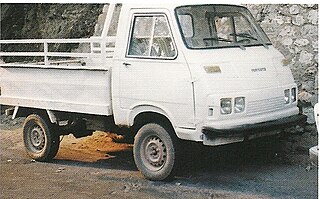
Record A.E.B.E. was the name of a Greek company producing agricultural machinery and vehicles, founded in Heraklion, Crete in 1957 and dissolved in 1999.

Diana (Διάνα) is the brand name for agricultural machinery produced by Irene Chrissadakou A.E. a company located in Tavros (Athens), Greece. Founded in 1976, it is one of the most successful in its field, also managing to survive the crisis in Greek manufacturing industry of the 1980s and 1990s.

Biomot was a small manufacturer of three-wheeled trucks and other metal products, based in Patras, Greece. Its trucks, produced since 1967, originally used rear-mounted VW air-cooled engines, as well as other VW parts. By 1975 the market for these vehicles had shrunk in Greece, being replaced by four-wheeled imported types. A new “modernized” front-engined model introduced by Biomot failed to save the company.





















